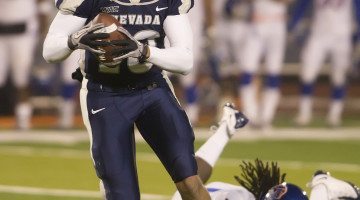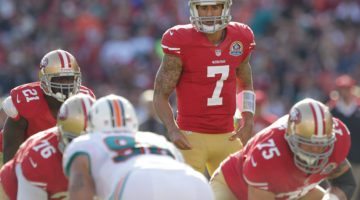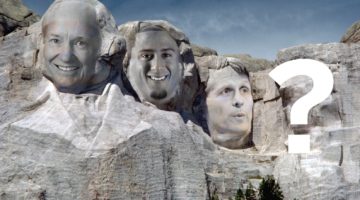
Photo courtesy of Wikipedia
U.S. Olympians Tommie Smith (center) and John Carlos
(right) raise their fists in peaceful protest at the 1968
Summer Olympics in Mexico City.
By Neil Patrick Healy
Another weekend of football has the country talking, and it wasn’t for the play on the field. No, the story of the weekend wasn’t the Redskins’ win over the Giants, or Eagles rookie quarterback Carson Wentz’s continued brilliance through the first three games of his career. The national conversation is still centered on the two minutes before kickoff. Two minutes where black men knelt or raised their fists in silent protest while the national anthem played. The two minutes that were once a formality before the action have now become more compelling than the game itself.
With the recent surge of protests engulfing the country and its consciousness, an outcry from many a football fan wishes for silence. “Not in my sports,” is a common request from many fans who just want to watch a game they love without thinking of this country’s social, racial or economic problems that seem to be mounting by the day. There’s Trump’s wall, Hillary’s emails, climate change and the struggling economy. For 3 1/2 half hours, we can forget about our tribulations and relax. Sports are an escape for many people from the grind of their own lives. Well, that’s the glorified mythology we attach to these games anyway.
If you really pay attention, you realize that the scripted moments we associate with sports just aren’t as prevalent or realistic as we’d like to think. Many people look at sports through their little-league sensibilities, and it’s only a disservice to them. Your favorite player may very likely leave in free agency, and athletes don’t care about the fans as we, the fans, would like them to. Some players don’t solely play for the love of the game but instead play for the millions of dollars and the spoils of fame. Owners are greedy, players aren’t supposed to be role models and social issues will always be a part of sports.
When people make the blanket statement that the playing field “isn’t the appropriate platform” for social issues to rear their head, they clearly don’t know their history. Athletics have been the stage for social demonstrations on numerous occasions.
At the 1906 Olympic games in Athens, Irish long jumper Peter O’Connor and two other Irishmen went to the Olympics with the intention of competing as their own team representing Ireland. At the time, Ireland was still under British rule, so the British Olympic Committee absorbed the Irish team and made the players compete for Britain.
When O’Connor won the silver medal in the long jump, the Union Jack was flying to represent his achievement during the medal ceremony. Instead of standing before the British flag, O’Connor bolted toward the flagpole. With Irish teammates and Irish-American athletes fighting off security, he scaled up the pole, ripped off the Union Jack and replaced it with the Irish flag. The flag, which read “Erin go Bragh” or “Ireland forever,” waved in front of 55,000 people, including the English royal family. It’s the first example of politics seeping into an athletic event.
The British were outraged by this radical action, but it represented how the Irish people felt at the time. O’Connor’s act of defiance was right in the middle of the Gaelic Revival — the renewed interest in Irish language, culture and traditions. Gaelic was being spoken on the streets of major cities in occupied Ireland, the ancient Irish sports of Hurling and Gaelic football were being played on the countryside, and the topic of home rule and independence from Britain began to pick up steam. Ten years after O’Connor tore down the Union Jack, the Easter Rising took place in Dublin and the Irish War of Independence began.
O’Connor’s social stand during an athletic event may have been the first, but it wasn’t the last. There’s heavyweight champion Muhammad Ali’s refusal to be drafted into the Vietnam War in 1966, which was one of the most controversial social statements in American history. Ali’s action and his response to mounting criticism being “Ain’t no Vietcong ever called me n****r” gave a voice to many African Americans in the U.S. who shared Ali’s sentiments. Ali was stripped of his title and was barred from fighting at home or abroad.
Tommie Smith and John Carlos’ Black Power salute at the 1968 Olympic games was probably the most photogenic protest. Smith and Carlos raised their fists to protest racial injustice during the national anthem (sound familiar?) after receiving their medals for the 200-meter dash. Smith and Carlos were suspended from the U.S. teams and were sent home from the games.
Former Cardinals center fielder Curt Flood challenged baseball’s established reserve clause, which was a contractual restriction to the rights of a player to join another team. Flood refused to be traded to the Philadelphia Phillies in 1969, stating he didn’t wish to play for the Phillies due to the team’s poor performance and a reputation of racial tensions in the fan base and the city as a whole. Flood forfeited the remainder of his career as the litigation went through the courts, and he never played baseball again.
The stories of these athletes follow a similar pattern. These issues didn’t begin when an Irish long jumper scaled a pole and ripped a flag down from its peak; they were boiling under the surface for years, sometimes hundreds of years, before people took notice. It’s not until someone of notoriety addresses an issue on a big stage before many people are even aware of it. I challenge you to find a stage that rivals the one provided by sports.
In last summer’s Olympics in Rio, an estimated 27.5 million people tuned in to watch the games. Despite being down in viewership from the 2012 games, the Olympic spotlight is still one of the brightest in the world. The estimated viewership of the 2008 Olympic opening ceremony was 984 million people worldwide.
How about in the U.S.? Out of the top 10 highest-rated TV broadcasts in 2015, only two were not related to football. 18 of the 20 most-watched broadcasts in U.S. history are Super Bowls? The most-watched TV event in U.S. history was Super Bowl XLIX, which was viewed by 115.2 million people. When something happens on the stage where the lights burn brightest, a message has a much greater impact than at a town hall meeting or a political rally.
The last point that needs to be made here is that a protest will undoubtedly make people angry or upset. The whole point is to make people uncomfortable. People are going to disagree. Flood was criticized as being a spoiled athlete. Smith and Carlos suffered as social outcasts for years in later life. O’Connor’s medals aren’t even recognized by British officials. Ali lost the prime of his career and millions of dollars, and he was vilified as a draft dodger. Even former Dodgers infielder Jackie Robinson, the first black baseball player to play in the Major Leagues, said that Ali’s actions were disappointing to black veterans and were too radical.
Each of these athletes suffered in one form or another, but their actions struck a cord in their communities and kept the conversation going. Ireland became an independent free state in 1922, 16 years after O’Connor flew the Irish flag in Athens. The reserve clause was overturned in 1975 and modern-day free agency came to be. Ali’s case went all the way to the Supreme Court and his conviction was overturned. He fought again and reclaimed the heavyweight title twice, and the Vietnam War came to an end in 1975. Smith and Carlos have gone from social pariahs to revered symbols of courage in the face of bigotry. Both were awarded the Arthur Ash Award for Courage in 2008 in honor of their civil action.
So the next time you scold Colin Kaepernick for taking a knee during the anthem, ask yourself if your feelings are misplaced. Are you going to be on the right side of history once this is all over?
Neil Patrick Healy can be reached at neil@sagebrush.unr. edu and on Twitter @NP_Healy.












